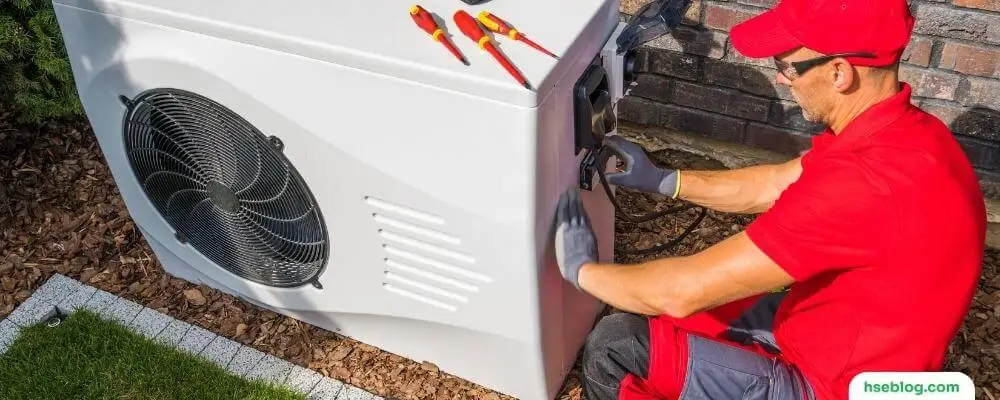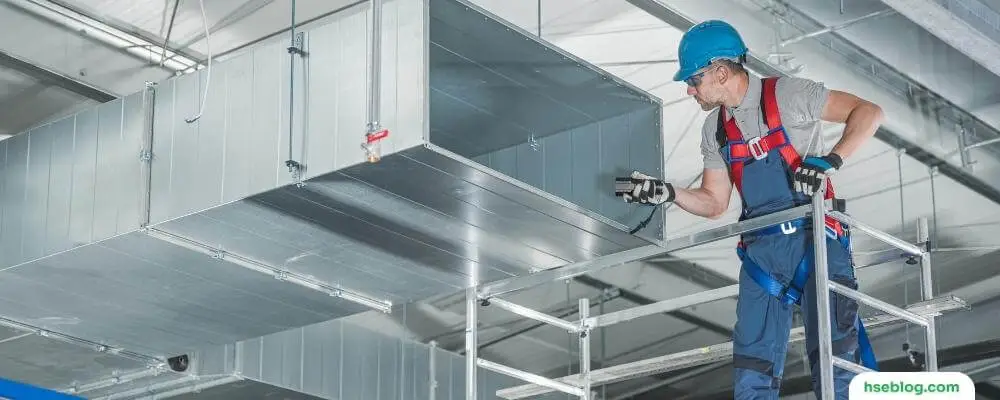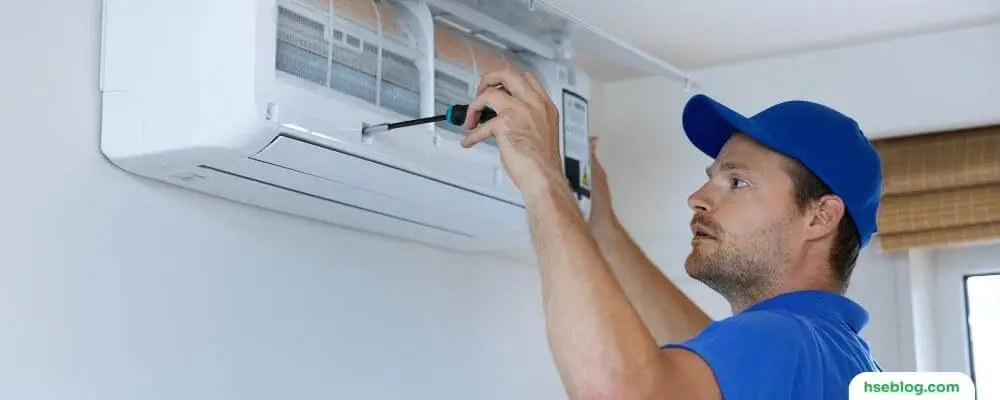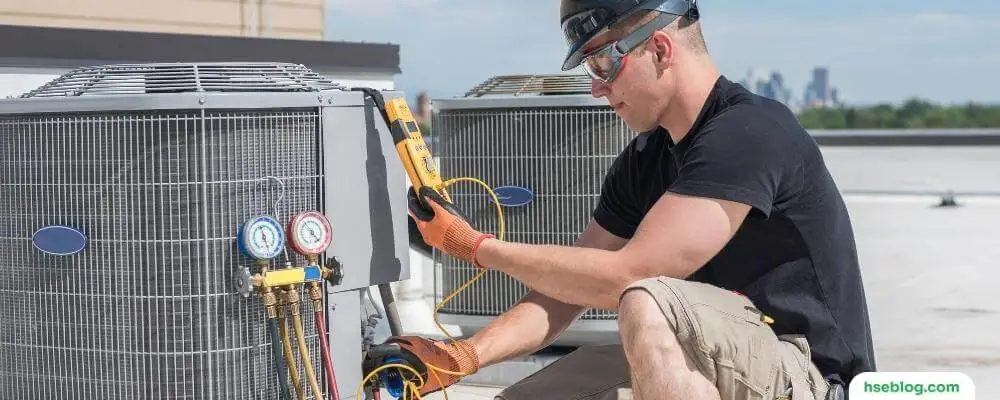Working as an HVAC professional in a heating and air conditioning company, you must feel rewarded in your career choice. There are no doubts about that because you can solve other people’s problems while enjoying a great salary.
But while working in the exciting world of the heating and cooling industry, you should also practice precautions to stay safe while on the job. Safety is big in your profession because you will be exposed to hazards. Keep reading and discover the top safety tips for your work.
Common HVAC Hazards
Working as an HVAC technician can be a rewarding career, but it can also present several hazards. Here are some common HVAC hazards to be aware of:
- Electrical Hazards: HVAC systems typically require electrical connections, which can pose a risk of shock or electrocution. An electrical hazard can occur if wires are exposed, improper insulated, or work is done without cutting the power.
- Chemical Hazards: Technicians often work with refrigerants and cleaning chemicals that can be harmful if inhaled, ingested, or contacted with the skin. Some refrigerants can also cause burns or frostbite on contact.
- Physical Strains: The HVAC field often requires heavy lifting and physical labor, which can lead to musculoskeletal injuries. There’s also the risk of overexertion, repetitive motion injuries, and injuries from working in awkward positions.
- Falls: HVAC systems are often in high or hard-to-reach places, such as rooftops or cramped attic spaces. This can lead to a risk of falls, especially if proper safety equipment isn’t used.
- Burns: Working with hot components or heated air can cause burns.
- Confined Spaces: HVAC work often requires technicians to work in confined spaces. These areas can pose risks of inadequate ventilation, difficult entry and exit, and the possibility of being trapped or crushed.
- Exposure to Extreme Temperatures: HVAC technicians can be exposed to extreme heat in the summer and cold in the winter, leading to heat stress or hypothermia.
- Loud Noise: HVAC equipment can be loud, and exposure to loud noise over time can lead to hearing damage or loss.
- Cuts and Abrasions: The job requires working with various tools and sharp objects, which can lead to cuts and abrasions if not handled carefully.
- Carbon Monoxide Poisoning: If HVAC systems aren’t properly maintained or vented, they can produce carbon monoxide, an odorless and colorless deadly gas.
Recognizing these hazards and implementing appropriate safety measures can help to reduce the risks associated with HVAC work.

How to Stay Safe on an HVAC Job: Key Tips
Working on HVAC (Heating, Ventilation, and Air Conditioning) jobs can involve various hazards, so it’s important to prioritize safety. Here are some key tips to help you stay safe on an HVAC job:
1. Take Time and Assess the Situation
Don’t just dive into the job and get your hands on it. Instead, take the time and assess the situation to get it right and safely the first time. It will be better to stay safe than rush it and get injured.
Taking the time and assessing the situation – this is how experienced heating and cooling companies work. Once you have your safety gear on, take a look around and assess the situation. Understanding how your work-in-progress schedule affects your company’s outcome is imperative. You must check for potential hazards on and around the heating and cooling system. It will also be a good idea to know what problem you are working with because every HVAC job is unique.
2. Put Your Safety First
Just like in other industries, safety comes first in the heating and cooling industry. Consider it as the top priority. For example, you may have to work around harmful contaminants and debris, which you can inhale easily when repairing an air conditioner.
To protect yourself from pathogens, dusts, and other contaminants, which may lead to infection and disease, wear your protective gear, such as a respirator to ensure that you won’t be inhaling contaminants. On the other hand, you should wear goggles to keep foreign objects away from your eyes. Also, you should wear gloves when handling objects, which can potentially cut your skin. You also need to know about the correct placement of ladders. Otherwise, wrongly placed ones can put your life in danger. That is why you should not hurry when setting up the ladder.
You should also see to it that it extends at least a foot for every 3 feet of height to prevent you from falling backward. And then, you also have to know about electrical safety to prevent electrocution or electrical shocks. As you know, you are dealing with electrical equipment daily, and the risk of electrical shock is high when a water leak occurs.
To prevent electrocution and equipment damage, turn off the main circuit breakers before working with the system. For additional help, you might want to watch safety videos tackling electrical safety for HVAC professionals.

3. Don’t Forget Chemicals
Chemical safety is another top priority. As you may already know, you’ll be in contact with various chemicals that can pose health hazards. It is one of the reasons you should get familiar with the substances you will deal with to handle them correctly.
A few hazardous chemicals you may come in contact with on the job include cleaning liquids, refrigerants, and solvents. You might suffer from skin burns if you don’t handle them properly. And worse, some of these chemicals might explode and lead to serious injuries.
To stay safe, you should know the proper procedures in handling, moving, and storing specific chemicals. Part of chemical safety is that you should not start working unless you’re wearing complete protective gear, including safety glasses and gloves.
4. Double Check Your Equipment
The pros working at heating and cooling companies move from one project/job site to another. It’s common and a part of their daily lives, so it is crucial to have the right tools and equipment for each of it. In addition, it is as important as taking some time to look over the condition of your equipment, which can make or break the job. Using broken or damaged equipment can harm your job and health.
So whether it is a wire stripper, a wrench, or a vacuum gauge, you must double-check them to ensure that you can complete the job safely and efficiently. For example, you should not work on a maintenance job without the right tools, or it may lead to accidents or injuries. You also should replace faulty tools to ensure you can perform the next job correctly. Nevertheless, you should do routine maintenance on the HVAC equipment to prevent using faulty ones that might lead to disasters on the job.
Good heating and cooling companies implement safety training for their technicians to ensure they’re safe when dealing with electricity, chemicals, and other potential hazards. Just as said, safety comes first – and it’s better than to deal with potential accidents, injuries and equipment damage later.

5. Practice Lifting Techniques
HVAC equipment can often be heavy and bulky. It’s essential to use proper lifting techniques to prevent back injuries or strains. Keep your feet shoulder-width apart, bend your knees, and keep your back straight as you lift. Using equipment such as dollies or lifting straps for heavy items may also be beneficial.
6. Be Aware of Your Surroundings
In many cases, HVAC professionals need to work in confined spaces or at heights. Always be aware of your surroundings and any potential hazards. When working in a confined space, ensure proper ventilation and wear the appropriate protective gear. When working at heights, use fall protection equipment to ensure your ladder is stable and secure.
7. Regularly Train and Update Your Safety Knowledge
Safety standards and best practices can change over time, so it’s crucial to regularly participate in safety training and keep up-to-date on industry standards. Take advantage of any training opportunities provided by your employer or industry associations. These could be on-site demonstrations, online courses, or safety workshops.
8. Stay Hydrated and Take Breaks
Many HVAC jobs require you to work outdoors in hot weather or in non-air-conditioned buildings. Staying hydrated and taking regular breaks is essential to prevent heat exhaustion. Also, ensure you have a proper diet to maintain your energy levels throughout the day.

9. Keep A First Aid Kit
Always have a well-stocked first aid kit readily available in case of an accident. Your kit should include bandages, antiseptic wipes, and other first aid supplies. Having a basic understanding of first aid procedures is also a good idea.
10. Communicate With Your Team
Effective communication with your team can help prevent accidents and misunderstandings. Ensure everyone is on the same page regarding safety procedures and job tasks. If you notice a potential hazard or unsafe condition, don’t hesitate to bring it to your supervisor’s attention.
11. Regularly Inspect the Worksite
Before starting a job, always inspect the worksite for any potential hazards. This could include unstable structures, electrical hazards, or unsafe working conditions. Regular inspections can help identify and mitigate risks before they become a problem.
Following these safety tips can help ensure a safe and productive work environment for everyone involved. Remember, your safety is paramount and should always be your top priority on the job.
Conclusion
In conclusion, safety should be a primary consideration for any HVAC professional due to the many potential hazards on the job. Adhering to the key safety tips, such as proper assessment of the situation before diving in, always using protective gear, handling chemicals properly, maintaining and checking equipment regularly, practicing correct lifting techniques, staying aware of surroundings, keeping up with safety training, staying hydrated, having a first aid kit at hand, communicating effectively with the team, and conducting regular worksite inspections can significantly decrease the risk of accidents and injuries. Ensuring safety in the HVAC industry protects the technician and creates a safe and productive working environment for everyone involved.

